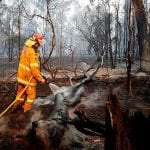Feed aggregator
The global water cycle has become more intense, and that makes New Zealand's wet regions wetter, and dry ones drier
Rising seas and melting glaciers: these changes are now irreversible, but we have to act to slow them down
Climate change has already hit Australia. Unless we act now, a hotter, drier and more dangerous future awaits, IPCC warns
IPCC says Earth will reach temperature rise of about 1.5℃ in around a decade. But limiting any global warming is what matters most
Major climate changes inevitable and irreversible – IPCC’s starkest warning yet
Report warns temperatures likely to rise by more than 1.5C bringing widespread extreme weather
- IPCC’s verdict on climate crimes of humanity: guilty as hell
- ‘Not too late’: Australian scientists call for urgent action to avoid worst of climate crisis
- Climate crisis ‘unequivocally’ caused by humans, says IPCC
- Download the free Guardian app; get our morning email briefing
Human activity is changing the Earth’s climate in ways “unprecedented” in thousands or hundreds of thousands of years, with some of the changes now inevitable and “irreversible”, climate scientists have warned.
Within the next two decades, temperatures are likely to rise by more than 1.5C above pre-industrial levels, breaching the ambition of the 2015 Paris climate agreement, and bringing widespread devastation and extreme weather.
Continue reading...What does the IPCC’s report mean for Australia, and what can we expect in the future?
As global temperatures rise, heatwaves, droughts, floods and other impacts will become more widespread, the sixth annual report says
- Major climate changes inevitable and irreversible - IPCC’s starkest warning yet
- IPCC’s verdict on climate crimes of humanity: guilty as hell
- Climate crisis ‘unequivocally’ caused by humans, says IPCC
- Download the free Guardian app; get our morning email briefing
The first major assessment of its kind in seven years from the UN’s Intergovernmental Panel on Climate Change has found the globe’s ocean, lands and air temperatures are rising, and the human influence is “unequivocal”.
But what does the IPCC’s Sixth Assessment Report say about changes in Australia, and what can we expect for the future?
Continue reading...Climate crisis ‘unequivocally’ caused by human activities, says IPCC report
Intergovernmental Panel on Climate Change states every corner of the planet is already being affected and it could get far worse
- IPCC report’s verdict on climate crimes of humanity: guilty as hell
- Humans have caused ‘unprecedented’ and ‘irreversible’ change to climate, scientists warn
“It is unequivocal.” Those stark three words are the first in the Intergovernmental Panel on Climate Change’s new report. The climate crisis is unequivocally caused by human activities and is unequivocally affecting every corner of the planet’s land, air and sea already.
The report, produced by hundreds of the world’s top scientists and signed off by all the world’s governments, concludes that it could get far worse if the slim chance remaining to avert heating above 1.5C is not immediately grasped.
Continue reading...“Unequivocal:” The nine most important climate messages from IPCC report
 The IPCC's new assessment report is a detailed and comprehensive statement of climate science. Here are nine key takeaways.
The IPCC's new assessment report is a detailed and comprehensive statement of climate science. Here are nine key takeaways.
The post “Unequivocal:” The nine most important climate messages from IPCC report appeared first on RenewEconomy.
“Clear and loud alarm bell”: IPCC puts pressure on leaders to act on climate
 "If this report makes you feel angry, sad and afraid, that is because it is angering, saddening and frightening."
"If this report makes you feel angry, sad and afraid, that is because it is angering, saddening and frightening."
The post “Clear and loud alarm bell”: IPCC puts pressure on leaders to act on climate appeared first on RenewEconomy.
This is the most sobering report card yet on climate change and Earth's future. Here’s what you need to know
Scientists issue desperate climate warning: Australia already at 1.4°C
 IPCC says average temperatures in Australia have already risen 1.4°C, warns that each fraction of a degree of warming will take its toll.
IPCC says average temperatures in Australia have already risen 1.4°C, warns that each fraction of a degree of warming will take its toll.
The post Scientists issue desperate climate warning: Australia already at 1.4°C appeared first on RenewEconomy.
Greece wildfires: Evia island residents forced to evacuate
The PRRO is unpopular because there is no clear evidence it is needed
 The ESB's proposals risk compensating assets that either aren’t needed, or don’t show up when you need them most.
The ESB's proposals risk compensating assets that either aren’t needed, or don’t show up when you need them most.
The post The PRRO is unpopular because there is no clear evidence it is needed appeared first on RenewEconomy.
Back of the pack: Australia trails world on energy transition and emissions
 Australia will get no medals for its performance on energy and emissions, with a new report showing it ranks among the worst performing countries on 10 key indicators.
Australia will get no medals for its performance on energy and emissions, with a new report showing it ranks among the worst performing countries on 10 key indicators.
The post Back of the pack: Australia trails world on energy transition and emissions appeared first on RenewEconomy.
Muddle headed wombats: Breaking down ESB’s capacity market obsession
 The worst outcome of a capacity market is to keep coal generation going without inducing new capacity.
The worst outcome of a capacity market is to keep coal generation going without inducing new capacity.
The post Muddle headed wombats: Breaking down ESB’s capacity market obsession appeared first on RenewEconomy.
Monday’s IPCC report is a really big deal for climate change
 The new IPCC report report will provide the most comprehensive understanding of the climate system and climate change, now and into the future.
The new IPCC report report will provide the most comprehensive understanding of the climate system and climate change, now and into the future.
The post Monday’s IPCC report is a really big deal for climate change appeared first on RenewEconomy.
Climate change: UN to reveal landmark IPCC report findings
Why China's climate policy matters to us all
Yes, a few climate models give unexpected predictions – but the technology remains a powerful tool
AGL picks Wärtsilä to build its first 250MW big battery at ageing gas plant
 AGL chooses Wärtsilä to build 250MW big battery in South Australia which could also be largest in world to deliver "grid forming" capabilities.
AGL chooses Wärtsilä to build 250MW big battery in South Australia which could also be largest in world to deliver "grid forming" capabilities.
The post AGL picks Wärtsilä to build its first 250MW big battery at ageing gas plant appeared first on RenewEconomy.



